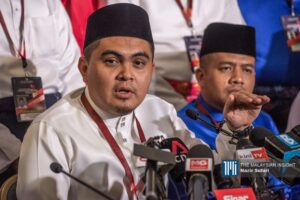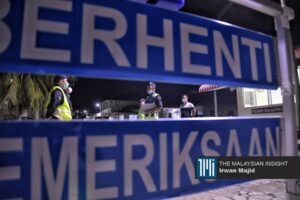
TODAY, as we celebrate 61 years since Malaysia’s formation, we also reflect on the remarkable journey of our nation – a journey that began with independence in 1957 and continued with the formation of Malaysia in 1963, uniting Peninsular Malaysia with Sabah and Sarawak. Our shared history has built a nation rich in diversity, grounded in our unique blend of ethnicities, cultures, and religions.
Diversity as strength
Malaysia thrives because of the contributions of all its people – whether Malay, Chinese, Indian, Iban, Kadazan, or from any of the other ethnic groups that shape our national identity. We are Muslims, Christians, Buddhists, Hindus, and people of other faiths, living in harmony and working together for the betterment of our country. This diversity does not simply define Malaysia; it is the foundation of our strength. It fuels our resilience and unity. Under the Kerajaan Madani, it is vital that we continue to embrace our diversity as we strive for a fair, just, and prosperous future. As a nation, we must advance with the shared aim of uplifting the happiness and potential of every Malaysian. Our vision must be one where every citizen – regardless of race, religion, or gender – is given the opportunity to thrive.
Madani society
At the heart of this vision lies the concept of a Madani society – a society founded not on the dominance of any single group, but on the values of sincerity, competence, transparency, and accountability. In this society, each person is treated as family, and justice and fairness become our guiding principles. All policies, institutions, and organisations – whether public or private – must align with these aspirations. Decisions should be motivated by the collective good, not by self-interest or narrow group, party, or state agendas. We must ensure that every individual has a fair chance, and that the people’s voices are not only heard but also integrated into the policies that shape the future of our nation.
Political empowerment of women
This vision of justice and fairness must materialise in the political empowerment of women. Women have long been essential to Malaysia’s development, contributing to our economy, communities, and families. Yet, women remain underrepresented in leadership roles, especially in politics. The commitment to ensuring at least 30% women’s representation in decision-making bodies at all levels of government has been a long-standing pledge of the Malaysian government. However, this goal remains unmet. Women currently occupy only 15% of parliamentary seats, far short of both the national target and the global average of 26%. In state assemblies and local governments, the figures are even lower. Political empowerment is not just about equity; it strengthens governance. Women bring unique perspectives and experiences to decision-making, ensuring that policies are more balanced and inclusive. Their involvement in leadership is essential to crafting policies that address the needs of all segments of society. This is not simply about meeting quotas; it is about reinforcing the foundation of our democracy.
Women’s role in decision-making
When women are represented in decision-making bodies, the resulting policies are more comprehensive, tackling a broader range of societal issues. Women often lead the way in advocating for healthcare, education, and family welfare – areas vital to our society’s well-being. Their voices provide essential perspectives needed to create policies that benefit everyone. Moreover, women’s political empowerment is linked to Malaysia’s overall progress. A government that includes women in its decision-making processes more accurately reflects the population it serves. Research shows that countries with greater women’s political participation tend to have more stable economies, higher levels of education, and lower levels of corruption. This long-overdue commitment must be fulfilled if we are to build a truly Madani society – one that is just, equitable, and prosperous for all.
Culture of feedback and accountability
As we move forward, we must emphasise the importance of cultivating a culture where feedback is both welcomed and valued. A healthy democracy listens to its people, respects their voices, and addresses their concerns. Feedback from the rakyat must play an integral role in governance, ensuring that policies reflect the people’s needs and aspirations. Accountability is key. We must ensure that all promises to the people are kept, including the promise of political empowerment for women. Encouraging open dialogue and constructive criticism will lead to a more inclusive and responsive government. This, in turn, builds trust and ensures that leadership focuses on the greater good, rather than narrow self-serving interests.
Shared vision for the future
As we celebrate Malaysia Day, let us take the opportunity to reflect on our nation’s journey and the challenges ahead. We have made significant strides as a country, but much remains to be done. The vision of a Madani Malaysia – an inclusive, just, and united society – can only be realised through the collective effort of all Malaysians. We must be bold in our aspirations and courageous in our actions. We must push for greater representation for women, not just in politics but in all sectors of society. We must work towards fulfilling the promises we have made to the people, ensuring that every Malaysian – regardless of race, religion, or gender – has the opportunity to succeed.
On this Malaysia Day, let us recommit to the values of unity, diversity, and justice that have guided us through the years. Let us build a nation where every Malaysian’s voice is heard, where everyone’s rights are respected, and where every citizen’s dreams can be realised. Together, we will build a Madani Malaysia, a nation strong not through the dominance of any one group, but through the collective strength, sincerity, and wisdom of all its people. – September 16, 2024.
“Selamat menyambut Hari Malaysia!”
* Rozaini MR reads The Malaysian Insight.
* This is the opinion of the writer or publication and does not necessarily represent the views of The Malaysian Insight. Article may be edited for brevity and clarity.






